一般将来时
一般将来时用法总结
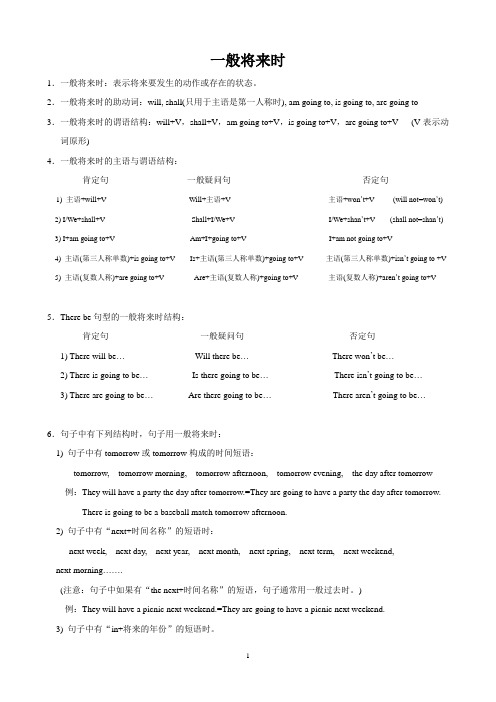
一般将来时1.一般将来时:表示将来要发生的动作或存在的状态。
2.一般将来时的助动词:will, shall(只用于主语是第一人称时), am going to, is going to, are going to3.一般将来时的谓语结构:will+V,shall+V,am going to+V,is going to+V,are going to+V (V表示动词原形)4.一般将来时的主语与谓语结构:肯定句一般疑问句否定句1) 主语+will+V Will+主语+V 主语+won’t+V (will not=won’t)2) I/We+shall+V Shall+I/We+V I/We+shan’t+V (shall not=shan’t)3) I+am going to+V Am+I+going to+V I+am not going to+V4) 主语(第三人称单数)+is going to+V Is+主语(第三人称单数)+going to+V 主语(第三人称单数)+isn’t going to +V5) 主语(复数人称)+are going to+V Are+主语(复数人称)+going to+V 主语(复数人称)+aren’t going to+V5.There be句型的一般将来时结构:肯定句一般疑问句否定句1) There will be…Will there be…There won’t be…2) There is going to be…Is there going to be…There isn’t going to be…3) There are going to be…Are there going to be…There aren’t going to be…6.句子中有下列结构时,句子用一般将来时:1) 句子中有tomorrow或tomorrow构成的时间短语:tomorrow, tomorrow morning, tomorrow afternoon, tomorrow evening, the day after tomorrow 例:They will have a party the day after tomorrow.=They are going to have a party the day after tomorrow.There is going to be a baseball match tomorrow afternoon.2) 句子中有“next+时间名称”的短语时:next week, next day, next year, next month, next spring, next term, next weekend,next morning…….(注意:句子中如果有“the next+时间名称”的短语,句子通常用一般过去时。
一般将来时
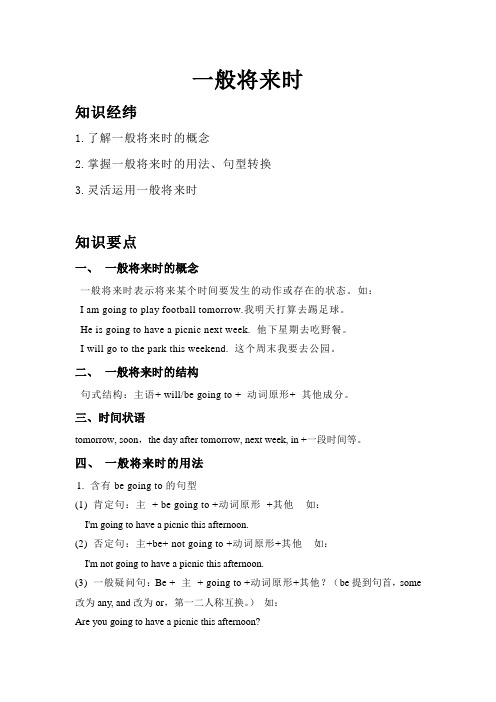
一般将来时知识经纬1.了解一般将来时的概念2.掌握一般将来时的用法、句型转换3.灵活运用一般将来时知识要点一、一般将来时的概念一般将来时表示将来某个时间要发生的动作或存在的状态。
如:I am going to play football tomorrow.我明天打算去踢足球。
He is going to have a picnic next week. 他下星期去吃野餐。
I will go to the park this weekend. 这个周末我要去公园。
二、一般将来时的结构句式结构:主语+ will/be going to + 动词原形+ 其他成分。
三、时间状语tomorrow, soon,the day after tomorrow, next week, in +一段时间等。
四、一般将来时的用法1. 含有be going to的句型(1) 肯定句:主+ be going to +动词原形+其他如:I'm going to have a picnic this afternoon.(2) 否定句:主+be+ not going to +动词原形+其他如:I'm not going to have a picnic this afternoon.(3) 一般疑问句:Be + 主+ going to +动词原形+其他?(be提到句首,some 改为any, and改为or,第一二人称互换。
)如:Are you going to have a picnic this afternoon?肯定回答:Yes, I am.否定回答:No, I’m not.2. 含有will的句型(will可用于所有人称,shall只用于第一人称I和we)( 1 ) 肯定句:主+ will +动词原形+其他如:I will play football tomorrow.(2) 否定句:主+ won’t +动词原形+其他(will后加not成won't)如:I won’t play football tomorrow.(3) 一般疑问句:Will + 主+ +动词原形+其他?(will提到句首,some改为any, and改为or,第一二人称互换) 如:Will you play football tomorrow?肯定回答:Yes, I will.否定回答:No, I won’t.五、一般将来时的特殊疑问句一般情况下,一般将来时的对划线部分有三种情况。
初中英语语法一般将来时

一般将来时一.一般将来时的定义:表示将来某一个时间将要发生的动作或存在的状态,表示将来经常或重复发生的动作。
二.一般将来时的标志:tomorrow(明天),the day after tomorrow(后天)next year(明年)next month(T—个月)next week(下一个星期)3.一般将来时的构成:1.主语^be(am,is,are)going to+动词原形+..例如:(1).I am going to play football tomorrow.明天我将要踢足球.(2).She is going to watch a movie the day after tomorrow.后天她要看一场电影.2.主语+will/shall+动词原形+.....说明:(l).will/shall有时可以和be going to互换;(2) .will是万能的,shall只能用在第一人称,主语是I,we.(3) .will和shall的后而接动词原形)例如shall/will go to Beijing next month.。
will=I11)下个月我将要去北京.(2) .You will come to see me tomorrow.(you will=you'll)明天你将要来看我.(3) .She will read English tomorrow moming.(She will=She'll)明天早上她将要读英语.四.句一般将来时的式:1.肯定句:(1) ..主语+be(am,is,are)going to+动词原形+......(2) ..主语+will/shall+动词原形+.....例句和上面一样,就不举了.2.否定句:(1)..主语+be(am,is,are)not going to+动词原形+......例如:(A):I am not going to play basketball tomorrow.明天我不将踢足球.(B).She is not/isn't going to visit Shanghai next year.明年她不将参观上海.(2)..主语+will/shall not+动词原形+.....(A).I shall not go to school the day after tomorrow o后天我不将上学了(B).I will not write my homework this evening.(will notl=I won't)今晚我不将写作业(C).She will not see a movie next week.(will not=won't)下个星期她将不看一场电影.3.一般疑问句:(A).Am/Is,Are+主语+going to+动词原形+....例如(A).—Am I going to see my grandfather tomorrow?明天我将去看我的爷爷吗?—Yes,you are.是的,你将去.(B).— Are you going to listening to the tape tomorrow?明天你将听录音带吗?—No,I am not.不,我不将.(C). —Is she going to Beijing next year? 明年我将去北京吗?-Yes,she is.是的,她将.(2).Will//shall+主语+动词原形+…例如(A). —Shall we play volleyball next class?下一节课我们将打排球吗?-Yes,you will,是的,你们将.(B). —Will you come here next week?下个星期你将来这儿吗?-Yes,I will.是的,我将.(C).--Will she teach us this term?这学期,她将教我们吗?—Yes,she will.是的,她将.4.特殊疑问句:(1).What(Where,How...)+be(am,is,are)+主语+going to+动词原形+...?例如:(A).—What are you going to do tomorrow? 明天你将要做什么?—rm going to the park? 我将要去动物园.(B).--Where are you going to swim? 你将要去哪儿游泳?—I'm going to swim in the river.(2). What(When,Where,How...)+主语+动词原形+...?例如:(A).---What will you do next week?下个星期你将要做什么?--1 will do my homeworko 我将要做作业.(B).—How will she come here tomorrow?明天她将要怎么来这儿?—She will come here by bus 。
一般将来时
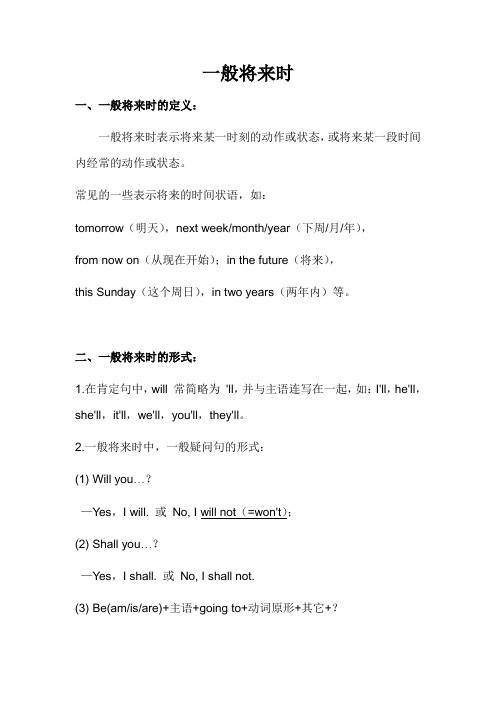
一般将来时一、一般将来时的定义:一般将来时表示将来某一时刻的动作或状态,或将来某一段时间内经常的动作或状态。
常见的一些表示将来的时间状语,如:tomorrow(明天),next week/month/year(下周/月/年),from now on(从现在开始);in the future(将来),this Sunday(这个周日),in two years(两年内)等。
二、一般将来时的形式:1.在肯定句中,will 常简略为'll,并与主语连写在一起,如:I'll,he'll,she'll,it'll,we'll,you'll,they'll。
2.一般将来时中,一般疑问句的形式:(1) Will you…?—Yes,I will. 或No, I will not(=won't);(2) Shall you…?—Yes,I shall. 或No, I shall not.(3) Be(am/is/are)+主语+going to+动词原形+其它+?如:Are you going to swim tomorrow?—Yes, I am./ No, I'm not.Is he/she going to play football next weekend?—Yes, he/she is./ No, he/she isn't.Are they going to go shopping this Sunday?—yes, they are./ No, they aren't.三、一般将来时的用法:1.一般将来时由“助动词shall(用于第一人称),或者will(用于第一、二、三人称)+动词原形”构成。
这种将来意义常常夹杂着情态意义即带有说话人的主观态度和看法,比如表示“预见”。
有时也含有“意愿”或“意图”的意思。
一般将来时
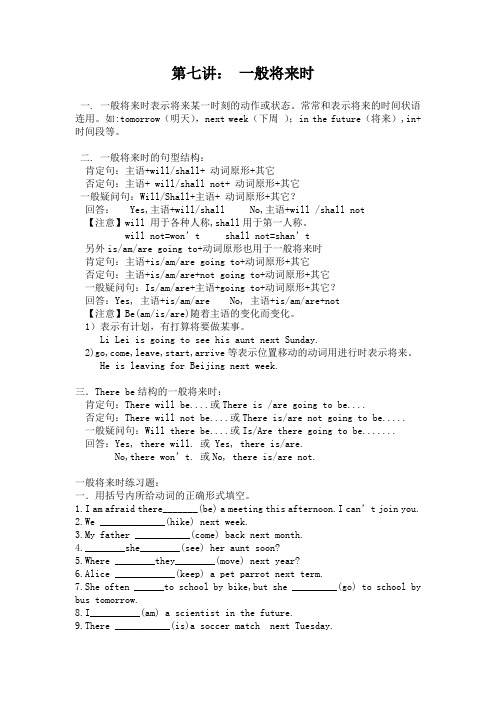
第七讲:一般将来时一. 一般将来时表示将来某一时刻的动作或状态。
常常和表示将来的时间状语连用。
如:tomorrow(明天),next week(下周);in the future(将来),in+时间段等。
二. 一般将来时的句型结构:肯定句:主语+will/shall+ 动词原形+其它否定句:主语+ will/shall not+ 动词原形+其它一般疑问句:Will/Shall+主语+ 动词原形+其它?回答: Yes,主语+will/shall No,主语+will /shall not【注意】will 用于各种人称,shall用于第一人称。
will not=won’t shall not=shan’t另外is/am/are going to+动词原形也用于一般将来时肯定句:主语+is/am/are going to+动词原形+其它否定句:主语+is/am/are+not going to+动词原形+其它一般疑问句:Is/am/are+主语+going to+动词原形+其它?回答:Yes, 主语+is/am/are No, 主语+is/am/are+not【注意】Be(am/is/are)随着主语的变化而变化。
1)表示有计划,有打算将要做某事。
Li Lei is going to see his aunt next Sunday.2)go,come,leave,start,arrive等表示位置移动的动词用进行时表示将来。
He is leaving for Beijing next week.三.There be结构的一般将来时:肯定句:There will be....或There is /are going to be....否定句:There will not be....或There is/are not going to be.....一般疑问句:Will there be....或Is/Are there going to be.......回答:Yes, there will. 或 Yes, there is/are.No,there won’t. 或No, there is/are not.一般将来时练习题:一.用括号内所给动词的正确形式填空。
一般将来时
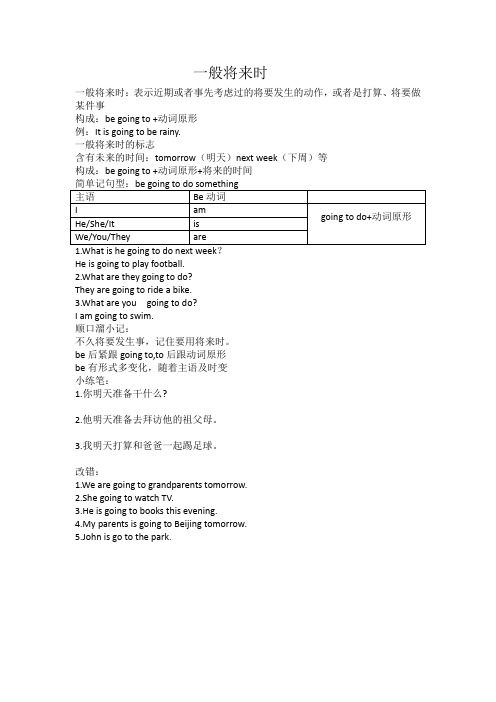
一般将来时
一般将来时:表示近期或者事先考虑过的将要发生的动作,或者是打算、将要做某件事
构成:be going to +动词原形
例:It is going to be rainy.
一般将来时的标志
含有未来的时间:tomorrow(明天)next week(下周)等
构成:be going to +动词原形+将来的时间
He is going to play football.
2.What are they going to do?
They are going to ride a bike.
3.What are you going to do?
I am going to swim.
顺口溜小记:
不久将要发生事,记住要用将来时。
be后紧跟going to,to后跟动词原形
be有形式多变化,随着主语及时变
小练笔:
1.你明天准备干什么?
2.他明天准备去拜访他的祖父母。
3.我明天打算和爸爸一起踢足球。
改错:
1.We are going to grandparents tomorrow.
2.She going to watch TV.
3.He is going to books this evening.
4.My parents is going to Beijing tomorrow.
5.John is go to the park.。
一般将来时的定义、结构、例句、用法
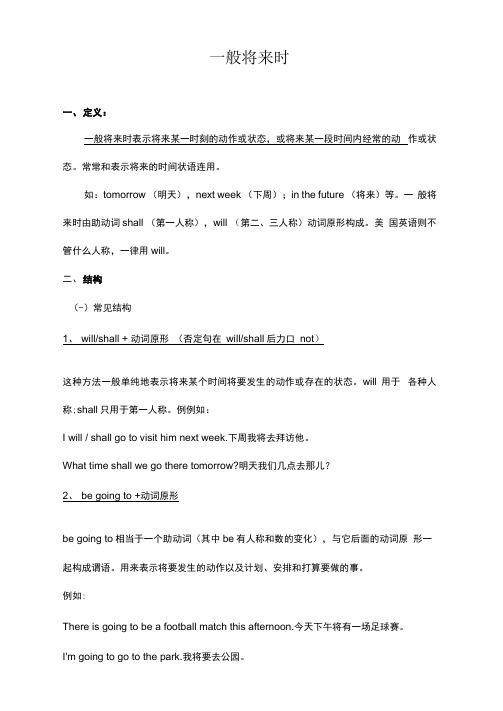
一般将来时一、定义:一般将来时表示将来某一时刻的动作或状态,或将来某一段时间内经常的动作或状态。
常常和表示将来的时间状语连用。
如:tomorrow (明天),next week (下周);in the future (将来)等。
一般将来时由助动词shall (第一人称),will (第二、三人称)动词原形构成。
美国英语则不管什么人称,一律用will。
二、结构(-)常见结构1、will/shall + 动词原形(否定句在will/shall后力口not)这种方法一般单纯地表示将来某个时间将要发生的动作或存在的状态。
will用于各种人称;shall只用于第一人称。
例例如:I will / shall go to visit him next week.下周我将去拜访他。
What time shall we go there tomorrow?明天我们几点去那儿?2、be going to +动词原形be going to相当于一个助动词(其中be有人称和数的变化),与它后面的动词原形一起构成谓语。
用来表示将要发生的动作以及计划、安排和打算要做的事。
例如:There is going to be a football match this afternoon.今天下午将有一场足球赛。
I'm going to go to the park.我将要去公园。
(-)常用结构1、用于"I expect, I'm sure, I think, I wonder 等的宾语从句"中。
Don't worry about the exam. I'm sure you'll pass.不要担心这次考试,我确信你会通过的。
2、用于祈使句和陈述句中。
Work hard and you will succeed.如果你努力,就会成功的。
3、与表示时间或条件的状语从句连用。
一般将来时总结
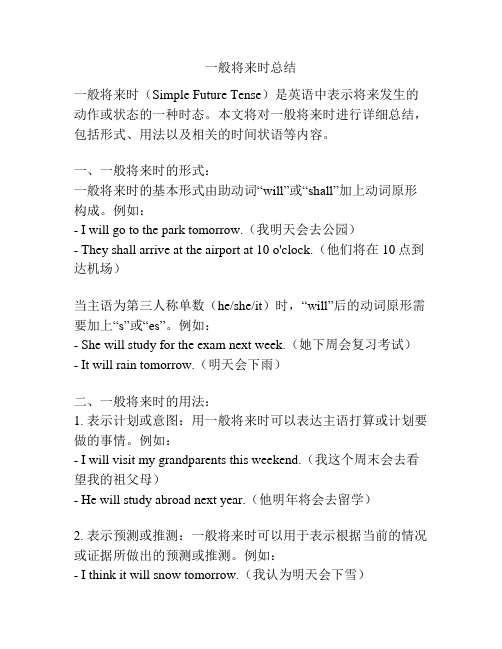
一般将来时总结一般将来时(Simple Future Tense)是英语中表示将来发生的动作或状态的一种时态。
本文将对一般将来时进行详细总结,包括形式、用法以及相关的时间状语等内容。
一、一般将来时的形式:一般将来时的基本形式由助动词“will”或“shall”加上动词原形构成。
例如:- I will go to the park tomorrow.(我明天会去公园)- They shall arrive at the airport at 10 o'clock.(他们将在10点到达机场)当主语为第三人称单数(he/she/it)时,“will”后的动词原形需要加上“s”或“es”。
例如:- She will study for the exam next week.(她下周会复习考试)- It will rain tomorrow.(明天会下雨)二、一般将来时的用法:1. 表示计划或意图:用一般将来时可以表达主语打算或计划要做的事情。
例如:- I will visit my grandparents this weekend.(我这个周末会去看望我的祖父母)- He will study abroad next year.(他明年将会去留学)2. 表示预测或推测:一般将来时可以用于表示根据当前的情况或证据所做出的预测或推测。
例如:- I think it will snow tomorrow.(我认为明天会下雪)- They believe she will win the competition.(他们相信她会赢得比赛)3. 表示意愿或允诺:一般将来时可以表达主语的意愿或承诺要做某事。
例如:- I will help you with your homework.(我会帮你做作业)- He will stop smoking.(他将戒烟)4. 表示预定的事件或安排的计划:一般将来时可以用于表示已经安排好的事件或计划。
一般将来时的四种句型结构
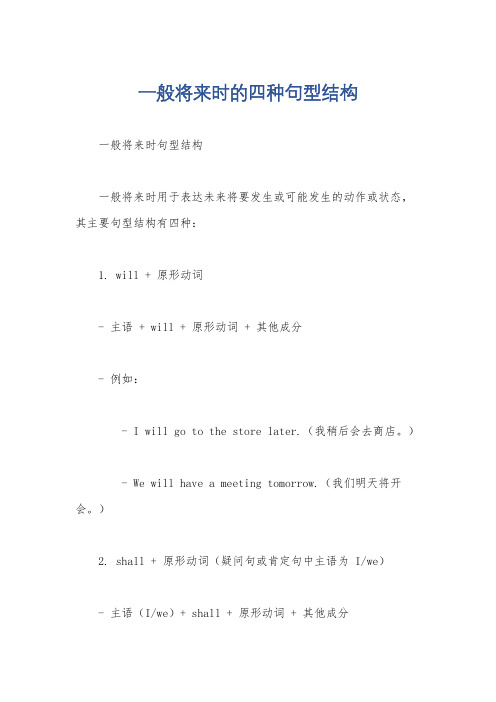
一般将来时的四种句型结构一般将来时句型结构一般将来时用于表达未来将要发生或可能发生的动作或状态,其主要句型结构有四种:1. will + 原形动词- 主语 + will + 原形动词 + 其他成分- 例如:- I will go to the store later.(我稍后会去商店。
)- We will have a meeting tomorrow.(我们明天将开会。
)2. shall + 原形动词(疑问句或肯定句中主语为 I/we)- 主语(I/we)+ shall + 原形动词 + 其他成分- 例如:- Shall I open the window?(我打开窗户好吗?)- We shall arrive at 10:00 AM.(我们将在上午 10:00 到达。
)3. be going to + 原形动词- 主语 + be going to + 原形动词 + 其他成分- 例如:- I am going to watch a movie tonight.(我今晚要去看电影。
)- They are going to build a new house.(他们打算建造一所新房子。
)4. be + about to + 原形动词- 主语 + be about to + 原形动词 + 其他成分- 例如:- I am about to leave.(我就要走了。
)- The train is about to depart.(火车就要出发了。
)一般将来时的用途一般将来时主要用于以下几种情况:- 表达未来将要发生的肯定动作或事件- 表达未来可能发生的动作或事件- 表示计划或打算- 表达预测或推测- 表示请求或建议(使用 shall 时)- 表示承诺或保证(使用 will 时)。
一般将来时态的结构和用法
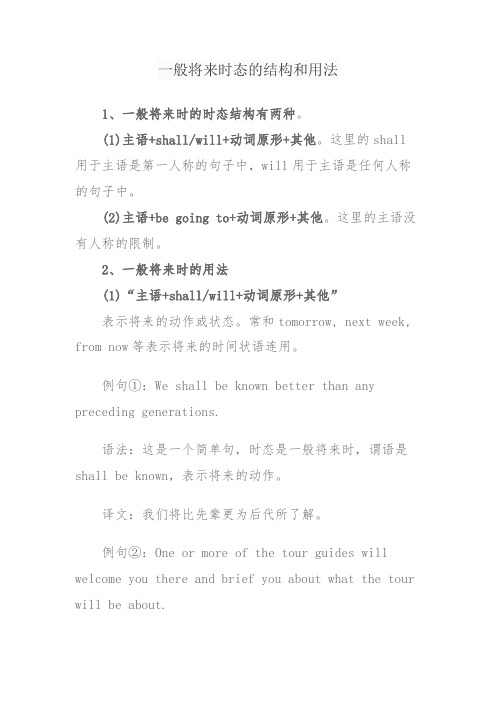
一般将来时态的结构和用法1、一般将来时的时态结构有两种。
(1)主语+shall/will+动词原形+其他。
这里的shall 用于主语是第一人称的句子中,will用于主语是任何人称的句子中。
(2)主语+be going to+动词原形+其他。
这里的主语没有人称的限制。
2、一般将来时的用法(1)“主语+shall/will+动词原形+其他”表示将来的动作或状态。
常和tomorrow, next week, from now等表示将来的时间状语连用。
例句①:We shall be known better than any preceding generations.语法:这是一个简单句,时态是一般将来时,谓语是shall be known,表示将来的动作。
译文:我们将比先辈更为后代所了解。
例句②:One or more of the tour guides will welcome you there and brief you about what the tour will be about.语法:这是一个主从复合句。
what引导的是宾语从句;主句和从句的时态都是一般将来时,谓语分别是will welcome…and brief和will be,表示将来的动作。
译文:有一个或几个导游会到那里迎接你们,并且向你们简要介绍参观的内容。
(2)“be going to+动词原形+其他”表示事先考虑过的将要发生的动作以及已有迹象表明必将要发生的某事,意为“打算,就要”。
例句:Now we go to Jane who is going to tell us about what's happening in town this weekend.语法:这是一个多重主从复合句。
who引导的是定语从句,该从句的时态是一般将来时,谓语是is going to tell;该定语从句中又包含一个由what引导的宾语从句,作介词about的宾语。
一般将来时
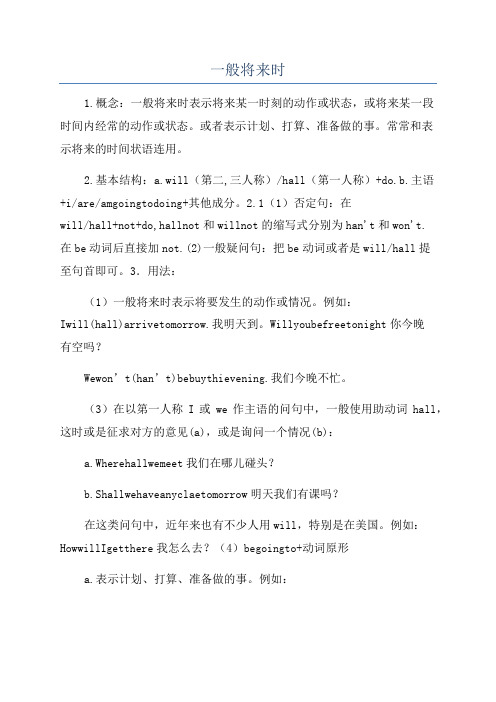
一般将来时1.概念:一般将来时表示将来某一时刻的动作或状态,或将来某一段时间内经常的动作或状态。
或者表示计划、打算、准备做的事。
常常和表示将来的时间状语连用。
2.基本结构:a.will(第二,三人称)/hall(第一人称)+do.b.主语+i/are/amgoingtodoing+其他成分。
2.1(1)否定句:在will/hall+not+do,hallnot和willnot的缩写式分别为han't和won't.在be动词后直接加not.(2)一般疑问句:把be动词或者是will/hall提至句首即可。
3.用法:(1)一般将来时表示将要发生的动作或情况。
例如:Iwill(hall)arrivetomorrow.我明天到。
Willyoubefreetonight你今晚有空吗?Wewon’t(han’t)bebuythievening.我们今晚不忙。
(3)在以第一人称I或we作主语的问句中,一般使用助动词hall,这时或是征求对方的意见(a),或是询问一个情况(b):a.Wherehallwemeet我们在哪儿碰头?b.Shallwehaveanyclaetomorrow明天我们有课吗?在这类问句中,近年来也有不少人用will,特别是在美国。
例如:HowwillIgetthere我怎么去?(4)begoingto+动词原形a.表示计划、打算、准备做的事。
例如:Wearegoingtoputupabuildinghere.我们打算在这里盖一座楼。
Howareyougoingtopendyourholiday假期你准备怎样过?b.表示即将发生或肯定要发生的事。
例如:Ithinkitigoingtonow.我看要下雪了。
(5)用一般现在时表示将来的情况。
在主从复合句中,当主句为一般将来时时,在if,aoona,until,when等引导的状语从句中用一般现在时代替一般将来时。
如:Ifitdoen’trainthiafternoon,we’llhaveaf ootballmatch.如果今天下午不下雨,我们将进行一场足球比赛。
一般将来时讲解(附习题+答案)

一般将来时讲解(附习题+答案)一、一般将来时的含义:表示动作发生在将来二、一般将来时的句型:(1) will/shall+动词原形(2) be going to+动词原形三、一般将来时的时间状语:tomorrow(明天)、the day after tomorrow(后天)、next...(下一...): next week(下一周)、next year(明年)、next month(下个月)in+一段时间(...之后): in three days(三天之后)、in the future在未来this evening(今天晚上)四、一般将来时的句型结构:(1) will/shall+动词原形(will not =won’t)(will 各种人称均可用,shall 只能用于第一人称)1)肯定句:主语+will/shall+动词原型...如:I will go to school tomorrow.我明天将会去学校He will go to school tomorrow.他明天将会去学校。
2)否定句:主语+will/shall+not+动词原型...如:I won’t go to school tomorrow.我明天将不会去学校。
He won’t go to school tomorrow.他明天将不会去学校。
3)一般疑问句:Will/Shall +主语+动词原型...如:Will you go to school tomorrow?你明天要去学校吗?Will he go to school tomorrow?他明天要去学校吗?肯定回答:Yes, 主语+will.如:Yes, I will.Yes, he will.否定回答:No,主语+will+not.如:No, I won’t.No, he won’t.4) 特殊疑问句:特殊疑问词+will/shall+主语+动词原型...如:What will you do tomorrow?你明天将会做什么?What will he do tomorrow?他明天将会做什么?(2) be going to+动词原形1)肯定句:主语+be going to +动词原型...如:I am going to buy some books tomorrow.我明天打算去买一些书。
一般将来时的用法及常见句型总结

一般将来时的用法及常见句型总结一般将来时是英语中用来表示将来发生的动作或状态的一种时态。
在句子中,一般将来时通常与表示将来的时间状语词搭配使用,如tomorrow(明天)、next week(下周)、in the future(将来)等。
同时,一般将来时也可以使用助动词will或shall来构成。
下面将介绍一般将来时的用法及常见句型。
1. 一般将来时的肯定句结构:主语 + will/shall + 动词原形 + 其他成分例如:- I will go to the park tomorrow.(我明天将去公园。
)- They will watch a movie tonight.(他们今晚将要看电影。
)2. 一般将来时的否定句结构:主语 + will/shall + not + 动词原形 + 其他成分例如:- She will not join the party.(她不会参加派对。
)- We shall not travel to Europe.(我们不会去欧洲旅行。
)3. 一般将来时的疑问句结构:Will/Shall + 主语 + 动词原形 + 其他成分?- Will you come to the concert?(你会来听音乐会吗?)- Shall we visit the museum tomorrow?(我们明天要参观博物馆吗?)4. 一般将来时的特殊用法:a. 表示计划或安排例如:- We will have a meeting next Monday.(我们下周一要开会。
)- They will go on a vacation in August.(他们八月份将去度假。
)b. 表示意愿或意图例如:- He will help you with your homework.(他愿意帮你做作业。
)- She shall buy a new car soon.(她打算很快买辆新车。
)c. 表示预测或推断例如:- It will rain tomorrow.(明天会下雨。
一般将来时

一般将来时的疑问句形式及回答
含一般将来时的句子变成一般疑问句只需把will或shall提到主语 前面即句首,并大写首字母就可以了。例如: 你下周要去北京。You will leave for Beijing next week.这句 话变成一般疑问句就是Will you leave for Beijing next week? 肯定回答是:Yes, I will.否定回答是:No, I won't. 含一般将来时的句子变成特殊疑问句的时候,通常结构是:特殊 疑问词+一般疑问句的语序。也就是: 疑问词+ will +主语+动词原形+其他成分。 如果是对主语提问,则主语部分就不在句子中出现。例如: I will leave for Beijing next week. 这句话可转换为以下特殊疑问句: Who will leave for Beijing next week? (对主语提问) When will you leave for Beijing? (对时间提问) Where do you leave for next week? (对地点提问)
By:Nina、Cynthia、Who、IVY
I will= I'll; she will = she‘ll;will not 和shall not分别可以 缩写为 won't 和shan't。
一、一般将来时的意义:
用来描述一个即将要发生的动作;谈 论未来的计划和打算。
二、一般将来时的基本结构:
will/shall+动词原形 be going to+动词原形
四、一般将来时在使用中的一些注意事项:
1、will用于一切人称,shall只用于第一
一般将来时定义,结构,标志词,用法,变化规则
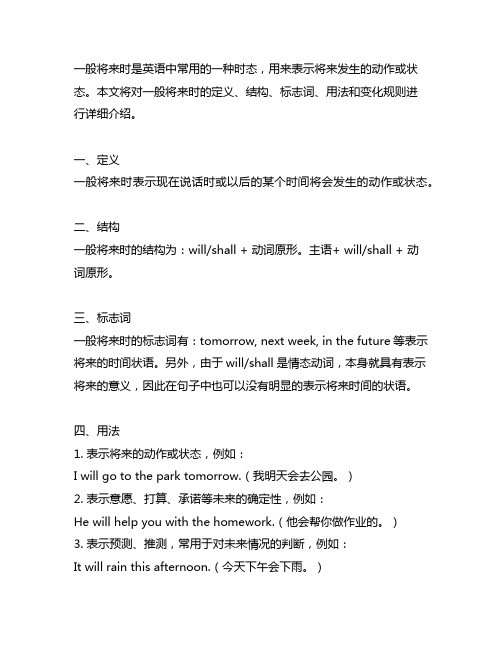
一般将来时是英语中常用的一种时态,用来表示将来发生的动作或状态。
本文将对一般将来时的定义、结构、标志词、用法和变化规则进行详细介绍。
一、定义一般将来时表示现在说话时或以后的某个时间将会发生的动作或状态。
二、结构一般将来时的结构为:will/shall + 动词原形。
主语+ will/shall + 动词原形。
三、标志词一般将来时的标志词有:tomorrow, next week, in the future等表示将来的时间状语。
另外,由于will/shall是情态动词,本身就具有表示将来的意义,因此在句子中也可以没有明显的表示将来时间的状语。
四、用法1. 表示将来的动作或状态,例如:I will go to the park tomorrow.(我明天会去公园。
)2. 表示意愿、打算、承诺等未来的确定性,例如:He will help you with the homework.(他会帮你做作业的。
)3. 表示预测、推测,常用于对未来情况的判断,例如:It will rain this afternoon.(今天下午会下雨。
)五、变化规则1. 肯定句的一般将来时结构为:will/shall + 动词原形。
例如:She wille to see me tomorrow.(她明天会来看我。
)2. 否定句的一般将来时结构为:will/shall + not + 动词原形。
例如:I will not go to the party tonight.(我今晚不会去参加派对。
)3. 疑问句的一般将来时结构为:will/shall + 主语+ 动词原形。
例如:Will youe to the meeting tomorrow?(你明天会来参加会议吗?)以上就是关于一般将来时的定义、结构、标志词、用法和变化规则的详细介绍。
希望对您有所帮助。
一般将来时是英语中最常用的一种时态之一,用于表示将来会发生的动作或状态。
小学英语一般将来时
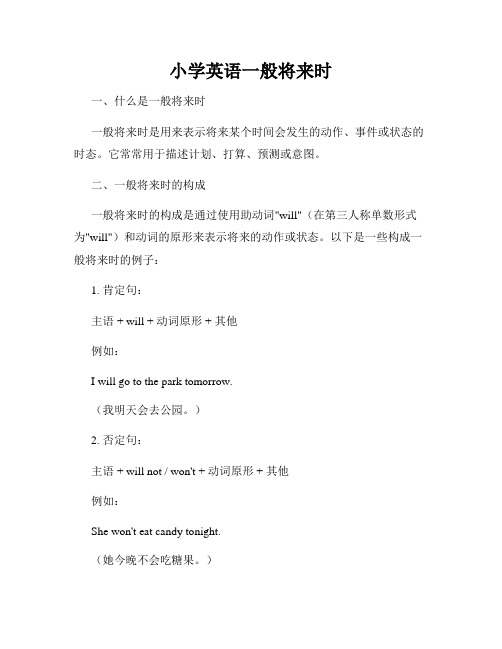
小学英语一般将来时一、什么是一般将来时一般将来时是用来表示将来某个时间会发生的动作、事件或状态的时态。
它常常用于描述计划、打算、预测或意图。
二、一般将来时的构成一般将来时的构成是通过使用助动词"will"(在第三人称单数形式为"will")和动词的原形来表示将来的动作或状态。
以下是一些构成一般将来时的例子:1. 肯定句:主语 + will + 动词原形 + 其他例如:I will go to the park tomorrow.(我明天会去公园。
)2. 否定句:主语 + will not / won't + 动词原形 + 其他例如:She won't eat candy tonight.(她今晚不会吃糖果。
)3. 疑问句:Will + 主语 + 动词原形 + 其他?例如:Will they come to the party?(他们会来参加派对吗?)三、一般将来时的使用场景下面是一些小学英语中常见的使用一般将来时的场景:1. 表示计划或打算:I will visit my grandparents next month.(我下个月会去拜访我的祖父母。
)2. 表示预测或推测:It will rain tomorrow.(明天会下雨。
)3. 表示意愿或承诺:I will help you with your homework.(我会帮你做作业。
)4. 表示未来常态:The school will start at 8:00 AM tomorrow.(明天学校将会在早上8点开始。
)5. 表示请求、命令或建议:Will you please pass me the book?(你能给我递一下那本书吗?)四、注意事项1. "will"后面的动词使用原形形式。
2. 助动词"will"可以缩写成"’ll"。
一般将来时
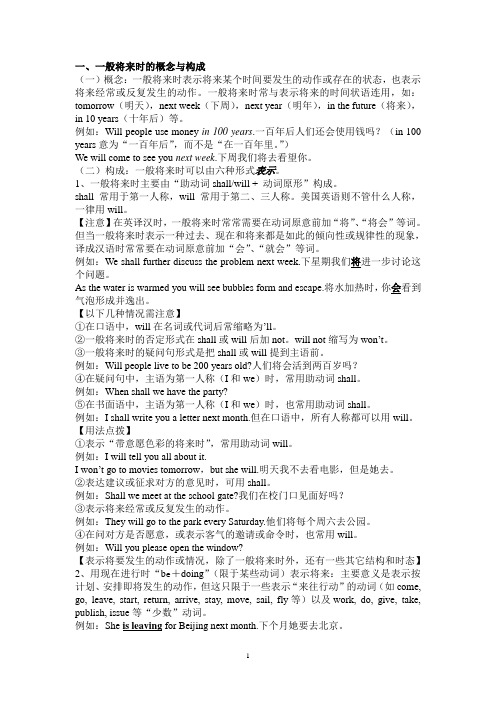
一、一般将来时的概念与构成(一)概念:一般将来时表示将来某个时间要发生的动作或存在的状态,也表示将来经常或反复发生的动作。
一般将来时常与表示将来的时间状语连用,如:tomorrow(明天),next week(下周),next year(明年),in the future(将来),in 10 years(十年后)等。
例如:Will people use money in 100 years.一百年后人们还会使用钱吗?(in 100 years意为“一百年后”,而不是“在一百年里。
”)We will come to see you next week.下周我们将去看望你。
(二)构成:一般将来时可以由六种形式表示。
1、一般将来时主要由“助动词shall/will + 动词原形”构成。
shall 常用于第一人称,will常用于第二、三人称。
美国英语则不管什么人称,一律用will。
【注意】在英译汉时,一般将来时常常需要在动词原意前加“将”、“将会”等词。
但当一般将来时表示一种过去、现在和将来都是如此的倾向性或规律性的现象,译成汉语时常常要在动词原意前加“会”、“就会”等词。
例如:We shall further discuss the problem next week.下星期我们将进一步讨论这个问题。
As the water is warmed you will see bubbles form and escape.将水加热时,你会看到气泡形成并逸出。
【以下几种情况需注意】①在口语中,will在名词或代词后常缩略为’ll。
②一般将来时的否定形式在shall或will后加not。
will not缩写为won’t。
③一般将来时的疑问句形式是把shall或will提到主语前。
例如:Will people live to be 200 years old?人们将会活到两百岁吗?④在疑问句中,主语为第一人称(I和we)时,常用助动词shall。
一般将来时
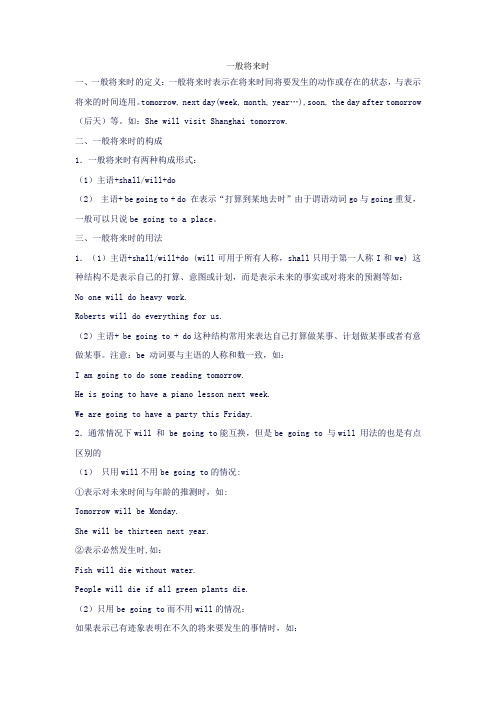
一般将来时一、一般将来时的定义:一般将来时表示在将来时间将要发生的动作或存在的状态,与表示将来的时间连用。
tomorrow, next day(week, month, year…),soon, the day after tomorrow (后天)等。
如:She will visit Shanghai tomorrow.二、一般将来时的构成1.一般将来时有两种构成形式:(1)主语+shall/will+do(2)主语+ be going to + do 在表示“打算到某地去时”由于谓语动词go与going重复,一般可以只说be going to a place。
三、一般将来时的用法1.(1)主语+shall/will+do (will可用于所有人称,shall只用于第一人称I和we) 这种结构不是表示自己的打算、意图或计划,而是表示未来的事实或对将来的预测等如:No one will do heavy work.Roberts will do everything for us.(2)主语+ be going to + do这种结构常用来表达自己打算做某事、计划做某事或者有意做某事。
注意:be 动词要与主语的人称和数一致,如:I am going to do some reading tomorrow.He is going to have a piano lesson next week.We are going to have a party this Friday.2.通常情况下will 和 be going to能互换,但是be going to 与will 用法的也是有点区别的(1)只用will不用be going to的情况:①表示对未来时间与年龄的推测时,如:Tomorrow will be Monday.She will be thirteen next year.②表示必然发生时,如:Fish will die without water.People will die if all green plants die.(2)只用be going to而不用will的情况:如果表示已有迹象表明在不久的将来要发生的事情时,如:Look at those black clouds, It’s going to rain.3.某些动词如:go/come/leave/start/begin/arrive等,它们的现在进行时可以表示将来时,如:They are leaving for Shanghaitomorrow.My brother is coming here soon.四、一般将来时的句式变换肯定句:主语+shall/will+do主语+ be going to + do否定句:主语+shall/will+not+do(will not 可缩写成won’t)主语+ be+ not+ going to +do一般疑问句:shall/will+主语+ dobe+主语+going to+do特殊疑问句:疑问词+ shall/will+主语+do疑问词+be+主语+going to+do〔1〕一般将来时肯定句:人+will+动词+名词+时间I will go to school tomorrow.He will play football on Monday.〔2〕一般将来时否定句:人+won't+动词+名词+时间I won’t go to school tomorrow.He won’t play football on Monday.〔3〕一般将来时是非疑问句提问:will+人+动词+名词+时间对它的回答:Yes,人+will / No,人+won'tWill you go to school tomorrow? Yes,I will / No,I won'tWill he play football on Monday? Yes,he will / No,he won't〔4〕一般将来时开放问题提问:what+will+人+动词+时间对它的回答:人+will+动词+名词+时间What will you do tomorrow?I will go to school tomorrow.。
一般将来时
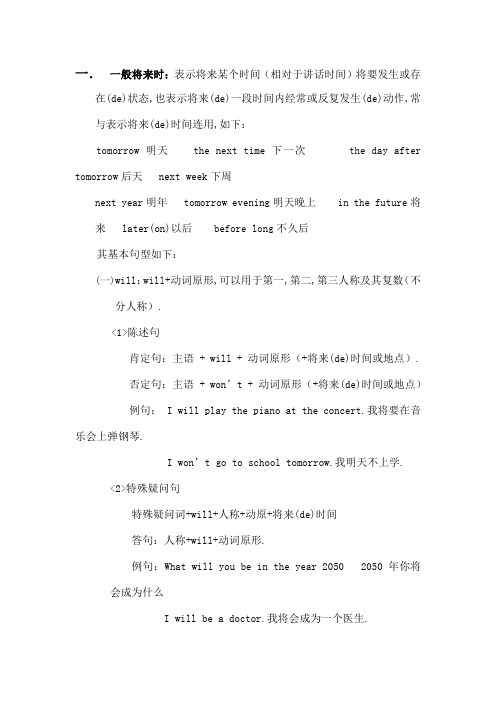
一.一般将来时:表示将来某个时间(相对于讲话时间)将要发生或存在(de)状态,也表示将来(de)一段时间内经常或反复发生(de)动作,常与表示将来(de)时间连用,如下:tomorrow明天 the next time下一次 the day after tomorrow后天 next week下周next year明年 tomorrow evening明天晚上 in the future将来 later(on)以后 before long不久后其基本句型如下:(一)will:will+动词原形,可以用于第一,第二,第三人称及其复数(不分人称).<1>陈述句肯定句:主语 + will + 动词原形(+将来(de)时间或地点).否定句:主语 + won’t + 动词原形(+将来(de)时间或地点)例句: I will play the piano at the concert.我将要在音乐会上弹钢琴.I won’t go to school tomorrow.我明天不上学.<2>特殊疑问句特殊疑问词+will+人称+动原+将来(de)时间答句:人称+will+动词原形.例句:What will you be in the year 2050 2050年你将会成为什么I will be a doctor.我将会成为一个医生.<3>一般疑问句Will+人称+动词原形(+将来(de)时间或地点)答句:Yes,人称+will. No,人称+won’t.例句:Will you visit your grandparents this Saturday 这周六你是否去拜访你(de)爷爷奶奶Yes, I will.(二)shall:shall+动词原形,只能用于第一人称(de)单复数(I, we)<1>陈述句肯定句:I/We shall + 动词原形(+将来(de)时间或地点).我/我们将要…否定句:I/We shall not + 动词原形(+将来(de)时间或地点).我/我们将不会…<2>特殊疑问句:特殊疑问词 + shall + 人称 + 动词原形(+将来(de)时间)答语: I/We shall + 动词原形例如:What shall we do 我们该怎么办Where shall I go 我该去哪呢<3>一般疑问句Shall I / we + 动词原形(+将来(de)时间或地点)答语:Yes, I / we shall. No, I / we shall not.例句:Shall I/ we go to school tomorrow 我/我们明天将要上学吗Yes, we shall. No, we shall not.(三)be going to结构,根据人称及单复数变换系动词be(de)形式(am,is, are).(1)be going to +动词原形,表示将来要做某事或发生某事.(2)be going to + 地点,表示将要去某地(3)be going there/here.将要去那里/这里一、单项选择.1. There __________ a meeting tomorrow afternoon.A. will be going toB. will going to beC. is going to beD. will go to be2. Charlie ________ here next month.A. isnt workingB. doesnt workingC. isnt going to workingD. wont work3. He ______ very busy this week, he ________ free next week.A. will be; isB. is; isC. will be; will beD. is; will be4. There ______ a dolphin show in the zoo tomorrow evening.A. wasB. is going to haveC. will haveD. is going to be5. –________ you ________ free tomorrow– No. I ________ free the day after tomorrow.A. Are; going to; willB. Are; going to be; willC. Are; going to; will beD. Are; going to be; will be6. Mother ________ me a nice present on my next birthday.A. will givesB. will giveC. givesD. give7. – Shall I buy a cup of tea for you–________.A. No, you wont.B. No, you arent.C. No, please dont.D. No, please.8. – Where is the morning paper– I ________ if for you at once.A. getB. am gettingC. to getD. will get9. ________ a concert next SaturdayA. There will beB. Will there beC. There can beD. There are10. If they come, we ________ a meeting.A. haveB. will haveC. hadD. would have11. He ________ her a beautiful hat on her next birthday.A. givesB. gaveC. will givingD. is going to giving12. He ________ to us as soon as he gets there.A. writesB. has writtenC. will writeD. wrote13. He ________ in three days.A. coming backB. came backC. will come backD. is going to coming back14. If it ________ tomorrow, well go roller-skating.A. isnt rainB. wont rainC. doesnt rainD. doesnt fine15. – Will his parents go to see the Beijing opera tomorrow – No, ________ .A. they willnt.B. they wont.C. they arent.D. they dont.16. Who _____ we ______ swimming with tomorrow afternoonA. will; goB. do; goC. will; goingD. shall; go17. We ________ the work this way next time.A. doB. will doC. going to doD. will doing18. Tomorrow he ________ a kite in the open air first, and then ________ boating in the park.A. will fly; will goB. will fly; goesC. is going to fly; will goesD. flies; will go19. The day after tomorrow they ________ a volleyball match.A. will watchingB. watchesC. is watchingD. is going to watch20. There ________ a birthday party this Sunday.A. shall beB. will beC. shall going to beD. will going to be21. They ________ an English evening next Sunday.A. are havingB. are going to haveC. will havingD. is going to have22. ________ you ________ free next SundayA. Will; areB. Will; beC. Do; beD. Are; be23. He ________ there at ten tomorrow morning.A. willB. isC. will beD. be24. ______your brother ______ a magazine from the libraryA. Are; going to borrowB. Is; going to borrowC. Will; borrowsD. Are; going to borrows25. – Shall I come again tomorrow afternoon–________ .A. Yes, pleaseB. Yes, you will.C. No, please.D. No, you wont.26. It ________ the year of the horse next year.A. is going to beB. is going toC. will beD. will is27. ________ open the windowA. Will you pleaseB. Please will youC. You pleaseD. Do you28. – Lets go out to play football, shall we– OK. I ________.A. will comingB. be going to comeC. comeD. am coming29. It ________ us a long time to learn English well.A. takesB. will takeC. spendsD. will spend30. The train ________ at 11.A. going to arriveB. will be arriveC. is going toD. is arriving改句子.5. Nancy is going to go camping.(改否定)Nancy _______ going to go camping.6. I’ll go and join them.(改否定)I _______ go _______ join them.7. I’m going to get up at 6:30 tomorrow.(改一般疑问句)_______ _______ _______ to get up at 6:30 tomorrow8. We will meet at the bus stop at 10:30.(改一般疑问句)_______ _______ meet at the bus stop at 10:30.9. She is going to listen to music after school.(对划线部分提问)_______ _______ she _______ _______ _______ after school10. My father and mother are going to see a play the day after tomorrow.(对划线部分提问)_______ _______ going to see a play the day after tomorrow.用所给词(de)适当形式填空.11. Today is a sunny day. We _______ (have) a picnic this afternoon.12. My brother _______ (go) to Shanghai next week.13. Tom often _______ (go) to school on foot. But today is rain. He _______ (go) to school by bike.14. What do you usually do at weekends I usually _______ (watch) TV and _______ (catch) insects15. It’s Friday today. What _______ she _______ (do) this weekend She _______ (watch) TV and _______ (catch) insects.16. What _______ (do) you do last Sunday I _______ (pick) apples on a farm. 17. Mary _______ (visit) her grandparents tomorrow.18. Liu Tao _______ (fly) kites in the playground yesterday.19. David _______ (give) a puppet show next Monday.20. I _______ (plan) for my study now。
一般将来时
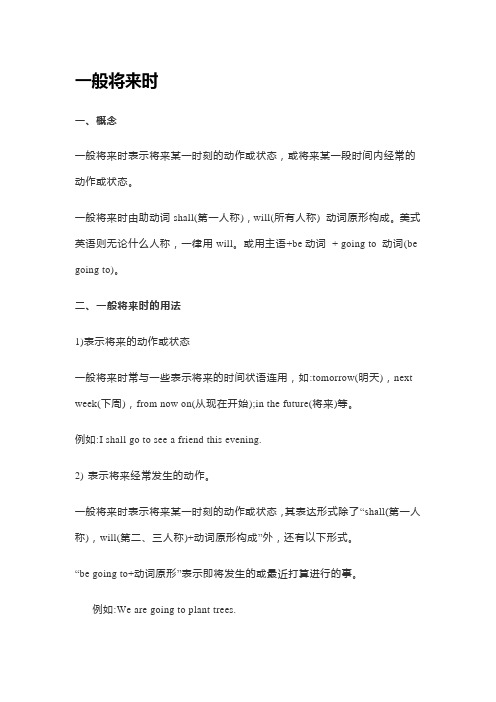
一般将来时一、概念一般将来时表示将来某一时刻的动作或状态,或将来某一段时间内经常的动作或状态。
一般将来时由助动词shall(第一人称),will(所有人称) 动词原形构成。
美式英语则无论什么人称,一律用will。
或用主语+be动词+ going to 动词(be going to)。
二、一般将来时的用法1)表示将来的动作或状态一般将来时常与一些表示将来的时间状语连用,如:tomorrow(明天),next week(下周),from now on(从现在开始);in the future(将来)等。
例如:I shall go to see a friend this evening.2)表示将来经常发生的动作。
一般将来时表示将来某一时刻的动作或状态,其表达形式除了“shall(第一人称),will(第二、三人称)+动词原形构成”外,还有以下形式。
“be going to+动词原形”表示即将发生的或最近打算进行的事。
例如:We are going to plant trees.三、一般将来时的句型①肯定句:主语+ be going to do /will/shall+ 动词原形②否定句:主语+ be not going to do /will not/shall not+ 动词原形③疑问句:Be动词+主语+ going to do /Will/Shall+主语+ 动词原形简略回答:(肯)Yes,主语shall/will (否) No,主语+shan't/won't④特殊疑问句:特殊疑问词+一般疑问句(就主语提问时,以疑问词who开头的疑问词除外)----- Why will you be here on Sunday?(周日你为什么将要在这儿?)-----I will have a meeting on Sunday(我将要在周日举行一个聚会)(对特殊疑问句要进行具体回答)一般疑问句:be或will提到句首,some改any,and改or,第一二人称互换We are going to go on an outing this weekend.-------Are you going to go on an outing this weekend?被动句:will/shall+be+v.ed(及物动词过去分词)The letter will be sent tomorrow.这封信明天将寄出去We shall be punished if we break the rule.如果我们违反规定,我们将受到惩罚。
- 1、下载文档前请自行甄别文档内容的完整性,平台不提供额外的编辑、内容补充、找答案等附加服务。
- 2、"仅部分预览"的文档,不可在线预览部分如存在完整性等问题,可反馈申请退款(可完整预览的文档不适用该条件!)。
- 3、如文档侵犯您的权益,请联系客服反馈,我们会尽快为您处理(人工客服工作时间:9:00-18:30)。
一般将来时一般将来时表示将来某个时间要发生的动作,事情或存在的状态,也表示将来经常或反复发生的动作或事情。
1)will/shall+动词原形shall用于第一人称,常被will 所代替。
will 在陈述句中用于各人称,在征求意见时常用于第二人称。
will not=won't shall not=shan't例如:Which paragraph shall I read first?我先读哪一段呢?Will you be at home at seven this evening? 今晚七点回家好吗?2)be going to +不定式,表示将来。
a. 主语的意图,即将做某事。
例如:What are you going to do tomorrow? 明天打算作什么呢?b. 计划,安排要发生的事。
例如:The play is going to be produced next month。
这出戏下月开播。
c. 有迹象要发生的事。
例如:Look at the dark clouds, there is going to be a storm. 看那乌云,快要下雨了。
3)be +不定式表将来,按计划或正式安排将发生的事。
例如:We are to discuss the report next Saturday.我们下星期六讨论这份报告。
4)be about to +不定式,意为马上做某事。
例如:He is about to leave for Beijing. 他马上要去北京。
注意:be about to do 不能与tomorrow, next week 等表示明确将来时的时间状语连用。
Notice:be to和be going tobe to 表示客观安排或受人指示而做某事,be going to 表示主观的打算或计划。
例如:I am to play football tomorrow afternoon. 明天下午我去踢球。
(客观安排)I'm going to play football tomorrow afternoon. 明天下午我想去踢球。
(主观安排)5.现在进行时表将来时下列动词的现在进行时表示将来时go. come. fly. leave. Start .begin. finish. end. arrive and so on.she is leaving for Wuhan tomorrow.6.一般现在时表将来1)下列动词come, go, arrive, leave, start, begin, return的一般现在时可以表示将来,主要用来表示在时间上已确定或安排好的事情。
例如:The train leaves at six tomorrow morning. 火车明天上午六点开。
When does the bus star? It stars in ten minutes. 汽车什么时候开?十分钟后。
2)以here, there等开始的倒装句,表示动作正在进行。
例如:Here comes the bus. = The bus is coming. 车来了。
There goes the bell. = The bell is ringing. 铃响了。
3)在时间或条件句中,也可以用一般现在进表将来。
例如:When Bill comes (不是will come), ask him to wait for me. 比尔来后,让他等我。
I'll write to you as soon as I arrive there. 我到了那里,就写信给你。
4)在动词hope, take care that, make sure that等的宾语从句中。
例如:I hope they have a nice time next week. 我希望他们下星期玩得开心。
Make sure that the windows are closed before you leave the room. 离开房间前,务必把窗户关了。
一般将来时精编练习题一:选择1.Mother ________ me a nice present on my next birthday.A. will givesB. will giveC. givesD. give2.He ________ her a beautiful hat on her next birthday.A. givesB. gaveC. will giveD. is going to giving3. He ________ in three days.A. coming backB. came backC. will come backD. is going to coming back4. Who ________ ________ swimming with us tomorrow afternoon?A. will; goB. do; goC. will; goingD. shall; goes5. The day after tomorrow they ________ a volleyball match.A. will watchB. watchesC. is watchingD. to watch6. They ________ an English evening next Sunday.A. are havingB. are going to haveC. will havingD. is going to have7. ________ you ________ free next Sunday?A. Will; areB. Will; beC. Do; beD. Are; be8. He ________ there at ten tomorrow morning.A. willB. isC. will beD. be9. I ____ _____ a teacher in the future.A. will, beB. is, beC. is, beingD. will, is10.They ____ _____ to the park next Sunday.A. will goesB. will goC. is goingD. will go11.My family ____ _____ to church next weekend.A. will goB. goesC. will goingD. is going12.My mother will ____ me a pencil tonight.A. givesB. givingC. give13.He ____ play football tomorrow.A. willB. isC. be14.My grandpa and grandma ____ ____ to see us in two days.A. will comingB. will comeC. is comingD. are coming15.She ___ ____ TV this evening.A. wills watchB. will watchingC. is watchingD. will watch16.My grandpa ____ _____ at home the day after tomorrow.A. will stayB. wills stayC. will staysD. is staying17.Mom will _____ back soon. A. comes B. coming C. comes D. come二、句型转换1. People in the north often go skating in winter. (next winter)2. There are two cinemas in that town. (next year)3. Li Ming is ten years old.(next year)4. I sometimes write to my mother in the evening.(tonight)5. Do you study hard?(from now on)一般将来时练习1.构成:will + 动词原形shall (用于第一人称)will not = won’t表示将来的时间:tomorrow, next week/ month/year, the day after tomorrow, in the future, this Sunday, in five days2.练习1.We (buy) him a pen for his birthday next week.2.I (call)you when I get there.3.Linda (not eat)chocolates any more.4 I (begin)to play computer games?5.If it is sunny tomorrow, we (have)a picnic outside.6.I (tell)him the news when I see him at the office.7.There (not be)a football match next month.8. he (give)a talk on “Works of art”next Friday?No, he _______. He ______ (visit) the Palace Museum.9. Where______Tom (go) the day after tomorrow?10. She ________ (not go) swimming this weekend.二.方位介词的使用1.The train is going ______ the tunnel.2. The cat is climbing _______ the tree.3.Tom likes jumping _______ the chair.4. The students are running________ the playground in the P.E.class.5. Mike walks______ school every day.6. If the traffic light is red. You can’t walk________ the road.7. My cousin often takes his pet a walk_______ the street.8.The robber pushed him______ a van.三.词汇:A 根据首字母提示及句意,完成单词:1. Look. Two policemen are walking t_______ us.2. Who is the m_________ of your class? Please take the books to the classroom.3. When you come to the c_______ of the road, please turn left.4. The t________ light is green. We can go across the road now.5. He was so s________ to see me at the meeting, because he thought I was in Beijing.B 根据中文提示及句意完成句子:6. The farmers cut the grass with sharp ___________ .(刀子)7. _____________(突然地),he heard someone crying, “help! help!”8.“Stop the short man, please! He is one of the ________ (抢劫者)!”the policeman shouted.9. We don’t think we will ________ (赢得) the football match.10. Stop ________ (跟着) me! I want to stay alone for a while.一. 用所给词的适当形式填空。
